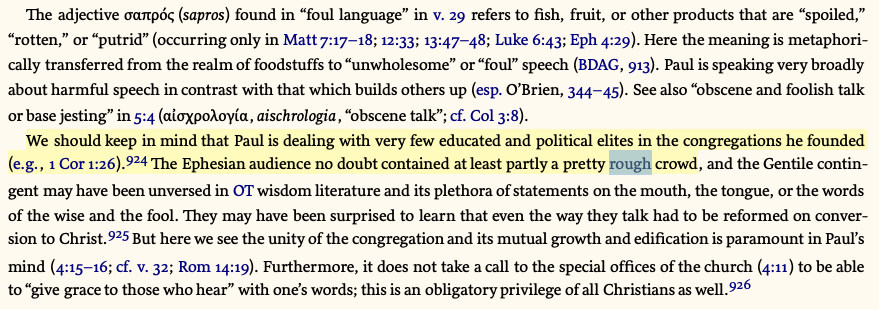Disappointed to see this in a commentary, 'We should keep in mind that Paul is dealing with very few educated and political elites in the congregations he founded... the Ephesian audience no doubt contained at least partly a pretty rough crowd.' Baugh, Ephesians: EEC 2015 p396...
...but I'm also not surprised because its common in Biblical academia to see the lower classes and non-white ethnicities associated with words such as 'rough' & 'rabble.' It reinforces stereotypes that our predominantly white middle class scholars are unable to see the harm of.
... and trains up another generation of Church leaders to think the same way, and equate a middle class education & culture with 'good' whilst the lower classes are either 'bad' or 'not as good'.
For another example, notice how the Hebrew word e'reb in Exodus is often translated as 'rabble' instead of 'mixed multitude' or other options. The implication is that the lower classes and other ethnicities are a rabble, inferior and associated with violence etc.
..and so again the myths are perpetuated that enable scholars like Baugh to link 'unwholesome' speech in Eph 4:29 to the lower classes.
... sadly, many will find no problem with such linkage, and will say, 'but its true' - but that's only if you make middle class academic culture the benchmark. If instead we use Jesus as the ultimate model of speech, we find ALL classes lacking...
... and there's even an argument that the upfront-ness found in British working-class speech is closer to Jesus's communication style ;)
lastly - just for the record, I really rate and respect Baugh, I've learned a lot from him, this is not meant as a swipe at him, but rather pointing out a broader problem in academia.
I just want to add some stuff about 'rabble'. In Ex 12:38 e'reb is translated by some as 'mixed', and others (like NLT) as 'rabble'. In Num 11:4 ʾǎsǎp̄·sǔp̄ is translated by many as 'rabble' and NLT has 'foreign rabble'. Both words are translated in LXX as epimiktos 'mixed.'...
I personally cannot find strong evidence to translate either Hebrew word as 'rabble.' You'll find some lexicons offer it as a gloss, but look at the evidence they cite...
and then consider the word 'rabble' and its history in 14th C of meaning a pack of animals, and its present day usage of 'the lowest class of people' or 'a disorderly crowd'...
and then notice how many lexicons, translators, and commentators link the word 'rabble' with 'foreigners' and 'lower classes', without batting an eyelid...
and consider the history in Europe and America of dehumanising both the poor, and other ethnicities, and then it starts to make sense how even modern day commentators and translators are still using this terminology.

 Read on Twitter
Read on Twitter


